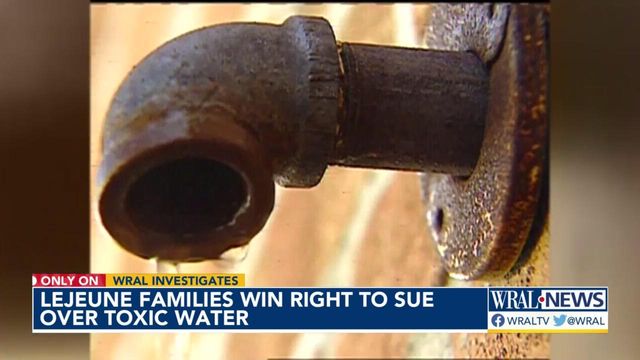Families fight for compensation for exposure to deadly, toxic water at Camp Lejeune
Millions of military veterans are now eligible for more care and in some cases, compensation for exposure to toxins while on duty.
For many of those veterans, the U.S. Senate’s impending passage of the Honoring our PACT Act is a victory decades in the making, as they tried to convince the Veterans Administration that their post-service illnesses were linked to their time in the military.
One section of the Jacksonville City Cemetery, near Camp Lejeune Marine Base, is a sad reminder of the cost of toxic exposure. It’s reserved solely for babies who died after they and their parents were exposed to toxic drinking water on the base for decades.
Dozens of grave stones have angels, bears and trucks, marking moments of life. The dates range from the 1950s through the 1980s. That’s the time period federal investigators determined hundreds of thousands of Marines and their families were exposed to well water contaminated by cleaning solvents.
Retired Marine Jerry Ensminger has become the face of the fight for justice.
"You wouldn’t believe the resistance I got from the Marine Corps," he told WRAL Investigates.
Ensminger’s daughter Janey was conceived and born while the family lived at Camp Lejeune in the '70s. She died of leukemia at age 9. It wasn’t until years later the grieving veteran linked his child’s death to the toxic water on base.
Ensminger said the Marine Corps spent years trying to cover up the problem.
"It didn’t take me too long to figure out, not only were they not going to step up and do what was right, they were doing everything in their power to do what was wrong," Ensminger said.
Ensminger joined then President Barack Obama for the signing of the 2012 law unofficially named for Janey that provided benefits for vets with presumptive illnesses tied to the poisoned water. Still missing, however, was a legal avenue for Lejeune military families to sue for relief. The Honoring our PACT Act does just that.
"It just brings back a lot of hurtful pains, memories," said Audrey Williams Pride, who now lives in Charlotte.
Pride lived on base with her Navy husband in the mid-80s. Despite a complication-free pregnancy, her son Willie, who would be 36 years old today, died at birth without explanation.
"I thought for the longest [time] it was something I did that caused the death of my child," she said.
Pride now blames the toxic water and wants the military to accept responsibility, but she adds it’s not about the money,
"For me it’s not [about the money]," Pride said. "[It's been] 36 years. I believe I would have let go a long time ago. For me, it’s about justice."
Epidemiologist Dr. Richard Clapp cites studies proving the toxic water has deadly consequences, including stillbirth.
"The levels that were detected in the early '80s at Camp Lejeune were among the highest, if not the highest I’ve ever heard of," Clapp said. He too believes families deserve help after all these years.
"If we can do it for Vietnam vets, we can do it for Camp Lejeune vets and their families," Clapp said.
Back at the cemetery, three grave stones lie together showing Baby Suzy Daniels died in 1963, Lucy in ’66, and Judy in ’70. WRAL Investigates contacted their mother Nancy Daniels, who confirmed all three were born and died while the family lived on base for more than a decade. She believes the toxic water contributed to the stillbirths.
"They didn’t give a damn," Ensminger said of the Marine Corps' handling of the tragedy. "The only thing they cared about was you open the tap and water came out."
Ensminger won’t stop speaking out for his family and thousands of others who lived at Lejeune. After 25 years in the Marines, this is his life’s mission.
"They figured they would get away with what happened at Camp Lejeune," Ensminger said. "I’m here to see that they don’t."












